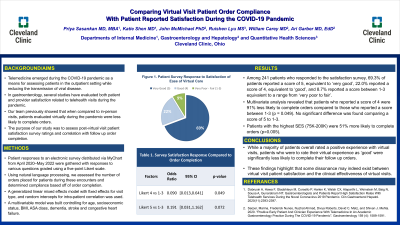Back


Poster Session D - Tuesday Morning
Category: Practice Management
D0632 - Comparing Virtual Visit Patient Order Compliance With Patient Reported Satisfaction During the COVID-19 Pandemic
Tuesday, October 25, 2022
10:00 AM – 12:00 PM ET
Location: Crown Ballroom

Has Audio

Priya Sasankan, MD, MBA
Cleveland Clinic Foundation
Cleveland, OH
Presenting Author(s)
Priya Sasankan, MD, MBA1, Katie Shen, MD2, John McMichael, PhD1, Ruishen Lyu, MS1, William Carey, MD1, Ari Garber, MD, EdD1
1Cleveland Clinic Foundation, Cleveland, OH; 2Cleveland Clinic, Cleveland, OH
Introduction: Telemedicine emerged during the COVID-19 pandemic as a means for assessing patients in the outpatient setting while reducing the transmission of viral disease. In gastroenterology, several studies exist showing both patient and provider satisfaction with virtual visits. However, several unanswered questions remain regarding the long-term sustainability of telemedicine in clinical practice. The purpose of our study was to assess post-virtual visit patient satisfaction survey ratings and correlation with follow up order completion.
Methods: Patient responses to an electronic survey distributed via MyChart from April 2020–May 2022 were gathered with responses to various questions graded using a five-point Likert scale. Using natural language processing, we assessed the number of orders placed for patients during these encounters and determined compliance based off order completion. A generalized linear mixed effects model with fixed effects for visit type, and random intercepts for intra-patient correlation was used. A multivariable model was built controlling for age, socioeconomic status, BMI, dementia, stroke and congestive heart failure.
Results: Among 241 patients who responded to the satisfaction survey, 69.3% of patients reported a score of 5, equivalent to ‘very good’, 22.0% reported a score of 4, equivalent to ‘good’, and 8.7% reported a score between 1-3 equivalent to a range from ‘very poor to fair’. Multivariate analysis revealed that patients who reported a score of 4 were 91% less likely to complete orders compared to those who reported a score between 1-3 (p = 0.049). No significant difference was found comparing a score of 5 to 1-3.
Discussion: While a majority of patients overall rated a positive experience with virtual visits, patients who were to rate their virtual experience as ‘good’ were significantly less likely to complete their follow up orders. These findings highlight that some dissonance may indeed exist between virtual visit patient satisfaction and the clinical effectiveness of virtual visits.
Disclosures:
Priya Sasankan, MD, MBA1, Katie Shen, MD2, John McMichael, PhD1, Ruishen Lyu, MS1, William Carey, MD1, Ari Garber, MD, EdD1. D0632 - Comparing Virtual Visit Patient Order Compliance With Patient Reported Satisfaction During the COVID-19 Pandemic, ACG 2022 Annual Scientific Meeting Abstracts. Charlotte, NC: American College of Gastroenterology.
1Cleveland Clinic Foundation, Cleveland, OH; 2Cleveland Clinic, Cleveland, OH
Introduction: Telemedicine emerged during the COVID-19 pandemic as a means for assessing patients in the outpatient setting while reducing the transmission of viral disease. In gastroenterology, several studies exist showing both patient and provider satisfaction with virtual visits. However, several unanswered questions remain regarding the long-term sustainability of telemedicine in clinical practice. The purpose of our study was to assess post-virtual visit patient satisfaction survey ratings and correlation with follow up order completion.
Methods: Patient responses to an electronic survey distributed via MyChart from April 2020–May 2022 were gathered with responses to various questions graded using a five-point Likert scale. Using natural language processing, we assessed the number of orders placed for patients during these encounters and determined compliance based off order completion. A generalized linear mixed effects model with fixed effects for visit type, and random intercepts for intra-patient correlation was used. A multivariable model was built controlling for age, socioeconomic status, BMI, dementia, stroke and congestive heart failure.
Results: Among 241 patients who responded to the satisfaction survey, 69.3% of patients reported a score of 5, equivalent to ‘very good’, 22.0% reported a score of 4, equivalent to ‘good’, and 8.7% reported a score between 1-3 equivalent to a range from ‘very poor to fair’. Multivariate analysis revealed that patients who reported a score of 4 were 91% less likely to complete orders compared to those who reported a score between 1-3 (p = 0.049). No significant difference was found comparing a score of 5 to 1-3.
Discussion: While a majority of patients overall rated a positive experience with virtual visits, patients who were to rate their virtual experience as ‘good’ were significantly less likely to complete their follow up orders. These findings highlight that some dissonance may indeed exist between virtual visit patient satisfaction and the clinical effectiveness of virtual visits.
Disclosures:
Priya Sasankan indicated no relevant financial relationships.
Katie Shen indicated no relevant financial relationships.
John McMichael indicated no relevant financial relationships.
Ruishen Lyu indicated no relevant financial relationships.
William Carey indicated no relevant financial relationships.
Ari Garber indicated no relevant financial relationships.
Ari Garber — NO DISCLOSURE DATA.
Priya Sasankan, MD, MBA1, Katie Shen, MD2, John McMichael, PhD1, Ruishen Lyu, MS1, William Carey, MD1, Ari Garber, MD, EdD1. D0632 - Comparing Virtual Visit Patient Order Compliance With Patient Reported Satisfaction During the COVID-19 Pandemic, ACG 2022 Annual Scientific Meeting Abstracts. Charlotte, NC: American College of Gastroenterology.
